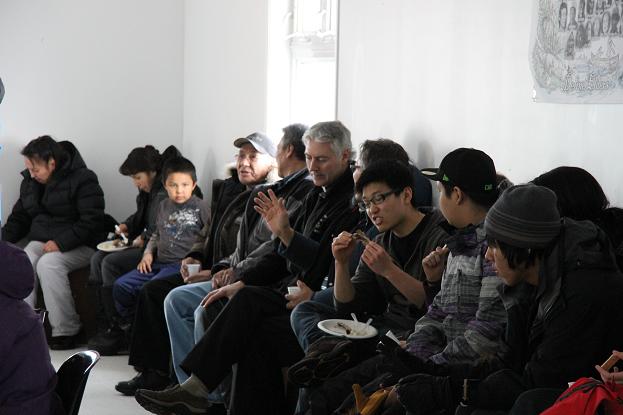Can the Arctic Council do development?
 This week at Arctic Frontiers, the high profile conference on Arctic issues held annually in Tromso, Norway, Canadian Minister for the Arctic Council Leona Aglukkaq outlined the overarching theme for the upcoming Canadian Chairmanship of the Council, which will begin its two-year term in May 2013: development for the people of the North.
This week at Arctic Frontiers, the high profile conference on Arctic issues held annually in Tromso, Norway, Canadian Minister for the Arctic Council Leona Aglukkaq outlined the overarching theme for the upcoming Canadian Chairmanship of the Council, which will begin its two-year term in May 2013: development for the people of the North.
The sub-themes, which were developed following Minister Aglukkaq’s well-received consultative tour of the territories this past Fall, include:
- Responsible Arctic resource development
- Safe Arctic shipping.
- Sustainable circumpolar communities.
These are apple pie and motherhood kinds of issues that no one will argue with. But Canada’s focus on human development also begs the question of what can and should be done at a regional level of governance.
One of the major organizing principles of governance is the concept of subsidiarity: that the smallest, lowest, or least centralized authority capable of handling a matter effectively ought to be the one to do it. Thus municipalities tend to take care of snow removal, provinces and states usually handle education, and national governments are responsible for foreign affairs, monetary policy and defense. The need for international cooperation arose over things like trade, peace treaties and defense pacts, and has intensified with globalization. Only since the end of WWII has another level of international governance developed – the regional level, which addresses issues that affected states cannot or will not address individually, but which make no sense to involve states that don’t share the borders of a particular geographical neighbourhood. The European Union is the most institutionalized regional organization, but they have popped up in every corner of the world from ASEAN to the Arab League to the OAS to the African Union.
Circumpolar cooperation
The Arctic Council developed out of the political space afforded by the end of the Cold War, but the functional need came from shared environmental and ocean concerns. These have intensified with climate changes and as a result so has circumpolar cooperation. The point is that regional governance in the Arctic is related to the Arctic states’ interdependence on Arctic environmental and ocean issues and the inability to address those issues – shipping, oil spill prevention and response, protection of the marine environment, etcetera – unilaterally.
The Arctic Council enshrined environmental protection in its foundational document, and its working groups focus primarily on aspects of it. But the Arctic Council’s second pillar is to promote sustainable development, something for which it has produced much less concrete results.
The Sustainable Development Working Group has been tasked with leading the Arctic Council’s work on human development, and it has done a good job with the resources it’s been given in fostering networks and promoting research on issues such as Arctic languages, suicide prevention and human health. But it should be accepted in the first instance that for an organization to promote development it should be in a position to either fund or implement development programs. The Arctic Council is not in such a position.
Development occurs at a local level, where education and healthcare is delivered, jobs are created, and lives are lived, and it is typically funded at a sub-regional (territorial/provincial/state) or national level. The Arctic Council is not at the best level of government to address human development. It is at the best level to address Arctic environmental and ocean issues, and appropriately it has focused on those so far.
Arctic peoples
We should not expect the Canadian Chairmanship to produce any concrete outcomes in terms of improving human development. However its chosen focus can build on the Arctic Council’s greatest strength: promoting shared values of inclusion and respect for Arctic peoples; accepting the role of local populations in influencing regional policy and providing space for that to occur; and ensuring that wherever economic development is occurring, efforts must be made to ensure it is as sustainable as possible. If the Canadian Chairmanship can share best practices, foster networks, support research, and incorporate local input into national strategies to improve human development in the Arctic, it will be successful, and it is on those criteria that it should be judged. Meanwhile, the bread and butter work of the Council – developing or supporting regulatory frameworks to manage shipping, fisheries, oil spill response and eventually a regional seas agreement – has to continue.
That leaves the bulk of the work for Arctic human development in the hands of sub-regional and national governments, and they should be judged accordingly. The progress that Ms. Aglukkaq can accomplish for Canada’s northern inhabitants as Minister for Arctic Council pales in comparison to what she could accomplish as federal Minister for Health as well as the Canadian Northern Economic Development Agency. The Harper government has rejected White Papers and grand strategies as tools for governing, and it’s true that ideas don’t become solutions just because they are written down. But it would be more productive to identify priorities for northern development and provide a timeline for meeting them on a national scale, than to pay lip service to them on a regional one.


